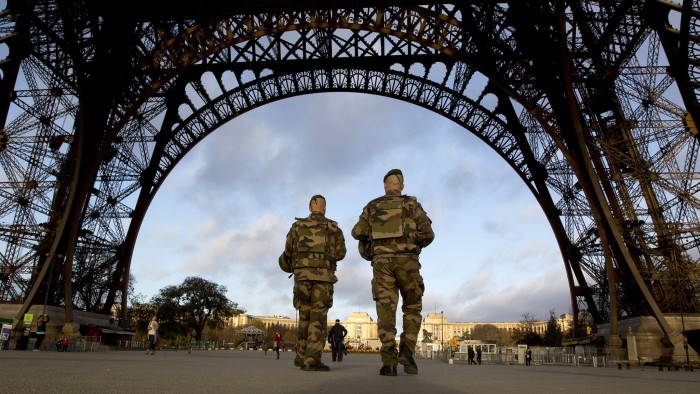Paris attacks: France in air strikes on Isis stronghold in Syria

Roula Khalaf, Editor of the FT, selects her favourite stories in this weekly newsletter.
France launched air strikes against Isis targets in Syria on Sunday night, with jets bombing the Islamist terror group’s stronghold of Raqqa.
The strikes came hours after France and the US pledged to step up the campaign against Isis in response to the chilling, co-ordinated terrorist attacks in Paris that killed 129 people and wounded more than 350.
Speaking in Antalya at the G20 summit, Laurent Fabius, French foreign minister, said: “France has always said that because she has been threatened and attacked by [Isis] it would be normal that she react in the framework of self defence. It would be normal to take action. That’s what we did with the strikes on Raqqa, which is their headquarter. We cannot let [Isis] act without reacting.”
The French defence ministry said 12 aircraft had taken part in raids on a command centre, munitions depot and training camp in Raqqa. The strikes were launched in co-ordination with US forces.
The flurry of air strikes marks a significant escalation of French involvement in the conflict in Syria. It also follows an agreement on Sunday by the Pentagon to accelerate the process for sharing intelligence about potential Isis targets with the French military.
The commitment to “intensify” action against the Islamic terrorist group in Syria came as France and Belgium launched a manhunt for a suspected eighth assailant, named as Salah Abdeslam, after an assault deemed “an act of war” by President François Hollande. Seven terrorists died on Friday night after six set off their explosives and another was shot by the police.

Manuel Valls, the French prime minister, has suggested that the state of emergency giving sweeping new investigative powers to police forces could be extended beyond 12 days — a move that would require approval by parliament.
World leaders attending a Group of 20 summit in Turkey united in condemning what US President Barack Obama called an attack “on the civilised world”. But they are struggling to rethink an anti-Isis strategy against the militant group behind the most complex series of attacks since September 11 2001.
Ben Rhodes, the US deputy national security adviser, said he was confident that in “coming days and weeks” the US and France would “intensify our strikes against [Isis] . . . to make clear there is no safe haven for these terrorists”.
Paris attacks: France’s year of terror

Country in the front line of Isis threat in Europe is repeatedly targeted in wave of plots
Read more
Besides raising questions over the vulnerability of European capitals to terrorism, the Paris attacks revived rightwing calls for tighter border controls across the EU, further complicating an already fraught debate over the migration crisis.
Jean-Claude Juncker, the European Commission president, hit back at demands — from eastern Europe in particular — for tighter borders, calling on politicians to stop conflating refugees with murderers.
Angela Merkel, the German chancellor, showed little sign of rethinking her approach to migration amid claims that one of the Paris attackers slipped into Europe with the flow of migrants through Greece.
Stressing the need to avoid jumping to conclusions, Ms Merkel said: “We owe this to the victims and their relatives [and] to the many innocent refugees that are fleeing war and terrorism.”

Paris attacks: More comment on FT.com
The treacherous path to defeating Isis
As assault on French capital shows Isis opening a bloody new front, impetus could build for Syria deal Read more
A proclamation against Isis, the party of death
Our citizens need a proclamation against Isis — the party of death, writes Simon Schama. Read more
Time for engagement, not fearful retreat
Solidarity and thoughtful action are the only means to defeat terrorism. Read more

Brussels’ concerns that the refugee crisis could upend the migration debate and place Europe’s passport-free Schengen zone in peril were underlined by Markus Söder, the Bavarian finance minister — of the CSU, sister party to Ms Merkel’s CDU — who said: “Paris changes everything.” If Germany could not secure its borders, he said, “then Bavaria can take on this task”.
With Republican US presidential candidates pressing for Nato to invoke “Article V” and declare the attacks an assault on all members of the Atlantic military alliance, the White House has joined Paris in planning for reinforced strikes in Syria.
France enters new era of mass terrorism

Nov 14, 2015: A series of co-ordinated attacks across Paris has left more than 120 people dead with Isis claiming responsibility. The FT’s Anne-Sylvaine Chassany reports from Paris on the aftermath.
During what White House officials described as a “constructive” meeting with President Vladimir Putin at the G20 talks, Mr Obama attempted to overcome differences with the Russian leader regarding Syria and agree ways to fight Isis.
Republican presidential candidates were not satisfied with the Obama administration’s pledges. They accused the president of being soft on Isis before the Paris attacks, and urged more aggressive US moves against the group, including the deployment of additional special forces troops.
Marco Rubio, one of the main candidates, said: “We’re going to have to conduct an increased number of special operations attacks, targeting Isis leadership and revealing that they are not invincible.”
Meanwhile, David Cameron, the British prime minister, signalled renewed determination to secure a mandate from parliament for strikes in Syria. “It’s become even more clear that our safety and security depends on degrading and ultimately destroying Isil [Isis], whether it’s in Iraq or Syria,” he said.
Listen to the podcast ‘Can world powers make common cause against Isis?’
Comments